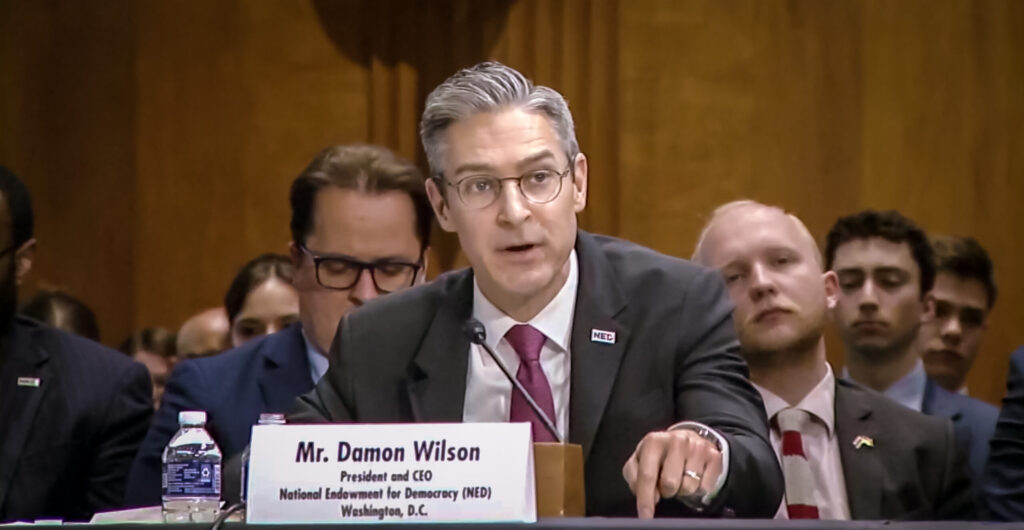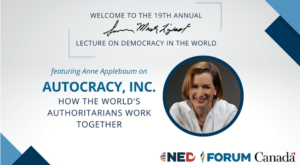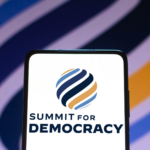
Last week in Moscow, as Chinese Communist Party (CCP) Chairman Xi Jinping was departing, he said to Vladimir Putin, “Now there are changes that haven’t happened in 100 years. When we are together, we drive these changes.” “I agree,” Putin said.
The changes they are referring to are meant to make the world safe for autocracy which, by definition, means a threat to democracy, National Endowment for Democracy (NED) President & CEO Damon Wilson observed. This underscores the biggest shift our nation must make in its support for democracy and human rights, he told today’s Senate Foreign Relations Committee:
 We must recognize that our work, and that of our partners on the ground, is taking place in a more hostile environment. Autocracies are waging a sophisticated, coordinated global campaign to undermine democracy. They are increasingly using technology, financial networks, and manipulated media environments together not only to better control their own people, but also to bolster each other, capture elites, and undermine democracies.
We must recognize that our work, and that of our partners on the ground, is taking place in a more hostile environment. Autocracies are waging a sophisticated, coordinated global campaign to undermine democracy. They are increasingly using technology, financial networks, and manipulated media environments together not only to better control their own people, but also to bolster each other, capture elites, and undermine democracies.
Our partners efforts to advance democracy keep us humble, Wilson said. They remind us that “made in Washington” strategies for a particular country won’t deliver sustainable democracy. Because the future of every nation ultimately lies in the hands of its own people. At NED, we don’t presume to tell our partners what they should do or how they should be governed.
The true reason that Venezuelan autocrat Nicolas Maduro remains in power is the international support he receives from enemies of the US, said Leopoldo Lopez (below). Maduro is clearly part of an autocratic network, comprising Russia, China, Iran, Belarus and Cuba, that is aligned to protect itself by diplomatically defending itself, he told the Senate FRC.
NED’s unique structure allows us to pivot quickly, so that we’re able to respond quickly to events, such as when Iranians suddenly mobilize in protest, or when there’s an opening for Sudanese, Tunisians, and Burmese to resume their path towards democracy, Wilson added. Think venture capital for democracy.
Yet despite rising authoritarianism, the human spirit is indomitable and cannot be repressed forever, he concluded. Lessons from the past teach that democracies are more resilient and autocracies more brittle than we sometimes see in darker moments. RTWT
The NED is committed to supporting opportunities that create common cause among citizens, government, and democratic institutions, NED Chairman Ken Wollack told a forum on “The Complex Path to Achieving Democratic Dividends” with government and civil society leaders from The Gambia and Côte d’Ivoire, held to mark the 2023 Summit for Democracy.
The Endowment is proud to support leaders like Marr Nyang, Executive Director of Gambia Participates, and Flan Moquet César, Director of Abidjan’s Center for Political Research, and countless others like them around the world, as they give voice to citizens and advance rights, freedoms, and accountability, he told the meeting, co-sponsored with the Millennium Challenge Corporation (MCC).
NED is known for utilizing a distinctive demand-driven grant making approach which distinguishes it within the donor community, the State Department observes in its latest Congressional Budget Justification:
 NED awards grants to support more than 2,000 projects in more than 100 countries a year. NED’s grants program is bolstered by the International Forum for Democratic Studies, a democracy research center that publishes the Journal of Democracy and administers the Reagan-Fascell Fellows Program; the World Movement for Democracy, a global hub for democracy networking and solidarity; and the Center for International Media Assistance, which studies and makes recommendations on strengthening media assistance abroad.
NED awards grants to support more than 2,000 projects in more than 100 countries a year. NED’s grants program is bolstered by the International Forum for Democratic Studies, a democracy research center that publishes the Journal of Democracy and administers the Reagan-Fascell Fellows Program; the World Movement for Democracy, a global hub for democracy networking and solidarity; and the Center for International Media Assistance, which studies and makes recommendations on strengthening media assistance abroad.
The FY 2024 Request of $300 million will enable NED to sustain a strong grants program in priority countries and regions, including continued support for NED’s four core institutes—the National Democratic Institute, the International Republican Institute, the Solidarity Center, and the Center for International Private Enterprise—along with grassroots civil society organizations in over 100 countries around the world, it adds. RTWT
To mark the Summit for Democracy, the International Forum for Democratic Studies has released a series of four issue briefs that highlight several emerging global challenges to democracy – on the integrity of the information space, transnational kleptocracy, emerging technology, and global authoritarian influence.
Given the extent to which autocratic regimes have proven adept at exploiting transnational flows of money, information, and technological know-how to their advantage, societies around the word must respond by adapting and cultivating new forms of collaboration, knowledge-sharing, and innovation.
Junto a @Tsihanouskaya, líder bielorrusa, quien al igual que nosotros, lucha en contra de las autocracias.
Unidos por un mismo objetivo: la libertad y la democracia, dentro y fuera de nuestras fronteras. pic.twitter.com/VSEsMcwcCI
— Leopoldo López (@leopoldolopez) March 28, 2023







